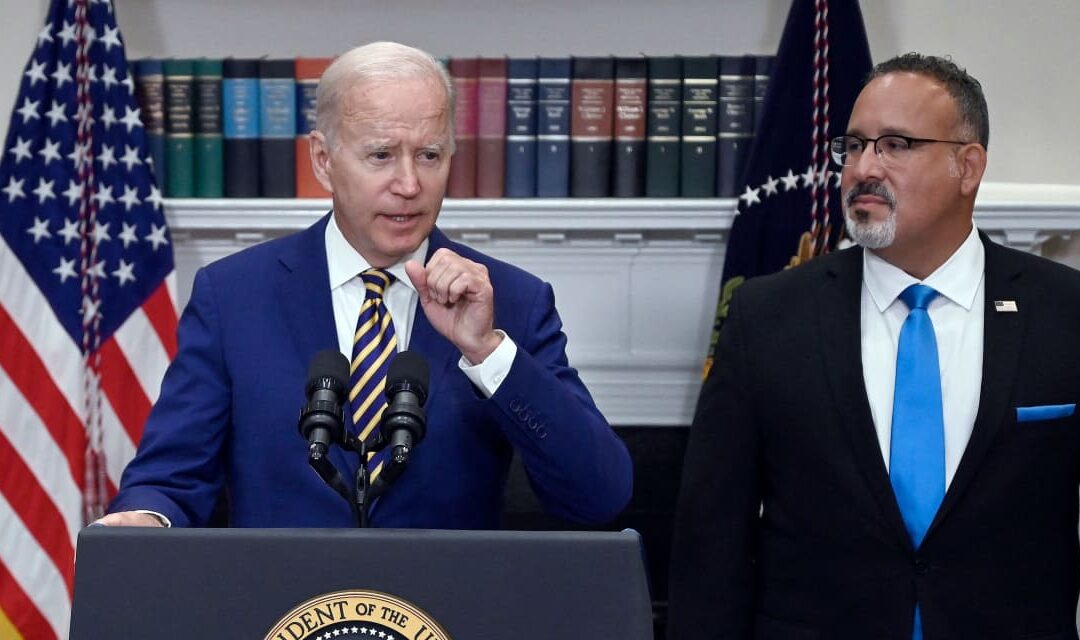Borrowers facing significant challenges repaying their student loans, including also having high medical, caretaking or other essential bills, could be eligible for cancellation of their student loans under the Biden administration’s new debt-relief plan.
The Department of Education said Thursday that it would include borrowers experiencing hardship repaying their student loans in its second stab at broad-based student-loan forgiveness. Officials also provided some detail as to who could be eligible for relief under the hardship designation on a conference call with reporters.
The announcement comes after pressure from lawmakers and advocates who said the White House hadn’t gone far enough in its proposals to cancel student debt following the Supreme Court’s June decision to strike down the administration’s initial plan, which would have affected 40 million borrowers. By including borrowers experiencing hardship repaying their loans in its new plan, the Department of Education is expanding the number of borrowers who could be eligible for relief.
Officials said it was too early to say how many borrowers would be affected by proposed relief plan. Still, multiple officials, including Secretary of Education Miguel Cardona, said the administration is “committed to delivering as much relief as possible to as many borrowers as possible as quickly as possible.”
After the Supreme Court struck down the Biden administration’s initial plan to cancel up to $20,000 in student debt, the White House announced it was taking another stab at debt relief. The so-called Plan B involves a process called negotiated rulemaking, in which stakeholders meet multiple times and discuss potential proposals.
So far, that process has yielded certain categories of borrowers who could be eligible for debt forgiveness under a new plan. Those include borrowers who have been paying on their loans for decades, borrowers whose balances exceed the amount they borrowed and borrowers who are eligible for forgiveness in other programs but haven’t yet applied for them.
As part of the meetings, the department had also said it would consider including borrowers experiencing hardship in the debt-relief proposals, but by the end of three sessions, negotiators expressed concern that the department hadn’t proposed language defining hardship for the negotiators to consider.
Advocates for borrowers worried that without a hardship category for debt relief, the path to forgiveness would be too narrow. “There’s many borrowers who have watched the proposals that we’ve discussed and voted on the last two days who don’t see themselves reflected in any of the pathways to relief, even though their loans are really negatively affecting their lives,” one negotiator said in December.
The text the department released Thursday will likely broaden the categories of borrowers eligible for relief. The department is proposing to allow the secretary of education to cancel up to the full balance of a loan if they determine it’s causing a borrower hardship. In making this determination, the secretary could consider things like a borrower’s income, assets, the total amount they owe, their age and their disability status.
The secretary could also look at whether a borrower received a Pell grant, the money the government provides to low-income students to attend college; if they receive certain public benefits; and if they’re facing high costs for things like healthcare, caretaking and housing. To assess whether a borrower is experiencing hardship, the secretary would be able to use data available to them or data gleaned from an application, according to the text.
Under this plan, the secretary would have the authority to cancel debt for borrowers facing hardship on “an ongoing basis,” a senior Department of Education official said.
In addition, the department is proposing canceling debt automatically for borrowers who have at least an 80% chance of defaulting on their loan within the next two years. This measure would be a one-time debt-relief program, the senior department official said.
Negotiators will meet to discuss the new proposal later this month, and after that, the department will release a rule outlining who would be eligible for debt forgiveness under a new plan.
It’s likely the proposal will face litigation, but opponents probably wouldn’t sue until the Biden administration releases its final rule, expected to be several months from now.
“We are trying to figure out how to be as expansive as possible within the limit of the law and the court decision,” a senior administration official told reporters.
Thursday’s announcement is part of a broad-based debt-relief proposal, which is different from debt cancellation the administration has already announced. So far, officials have announced more than $136 billion in debt relief for borrowers eligible for forgiveness programs that have been on the books for years. Those include some public servants, borrowers facing severe disabilities and some who have been in repayment on their debt for decades.
“Today’s announcement is another step forward in that commitment to making sure more borrowers, particularly those struggling to pay back their student loans, can get back on their feet, become homeowners, start businesses or pursue dreams they had to put on hold,” White House Press Secretary Karine Jean-Pierre said.









